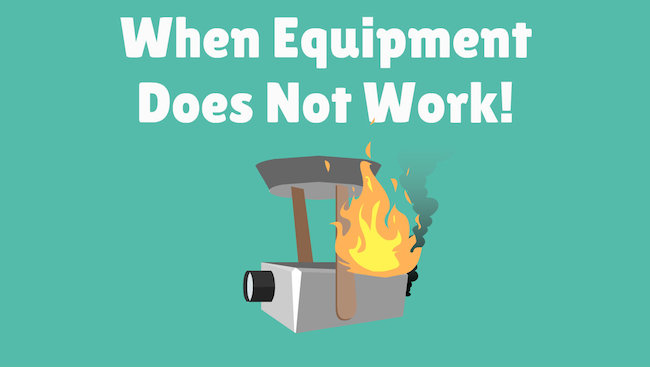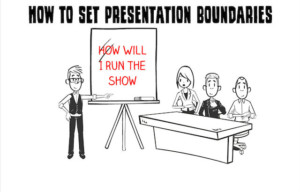… When you think your presentation is going well Murphy’s law strikes again!
Murphy’s Law states that ‘anything that can go wrong, will go wrong.’ This seems to be especially true when you consider public speaking.
Speaking in front of others is already a frightening experience, and when things start to go wrong during the presentation, it can become even more stressful. The good news is, if you’re aware of and prepared to handle certain setbacks, you can easily recover.
Today I’d like to give you some tips on how to avoid, as well as how to recover from, four common public speaking mishaps.
Mishap #1 – You run out of time.
Dragging a presentation on longer than your allotted time is one of the most common mistakes made by rookies in public speaking.
It’s critical to try to stay within your allotted time. In fact, if you can, end a littler earlier than you’re supposed to! Remember, your presentation time is an implicit contract with your audience. Professionals, now a day are very time sensitive. Having a presentation go longer than it’s supposed to can cause your audience to become annoyed with you, but a shorter presentation will likely cause them to be pleased with you.
Unfortunately, sometimes other presenters go, over their allotted time and can cause your time slot to be shortened, you should still try to finish in your given time slot.
How to prevent it.
– Practice your speech. A lot. And be sure to time yourself every time you practice. The more you practice your speech, the more comfortable you are when you’re giving it. Additionally the more you practice you’ll be able to get an idea of exactly how long it will take you to present. Keep in mind that your speech will likely take longer than what you’ve practiced, so, plan accordingly. The worst case scenario is that you end early and that at least leaves you time for any questions or to simply let your audience out early.
Practicing your presentation is what allows you to determine if you have enough time to give your entire speech, or if you have to remove certain words to get your point better across in fewer words. Timing is everything. View it as if you are borrowing your audience’s time. They’re investing in you, so don’t abuse that trust.
Tip – Internalize, don’t memorize. Memorization will leave you with zero flexibility during a presentation. You will have to say things in a specific order and specific sequence, and that’s dangerous. Practice until you have the concepts internalized. Which means you know the topic inside out and you can say what you need to say in many different ways. It gives you flexibility just in case something goes wrong, and you need to cut something out or add something new in based on the circumstance.
– Know the main points of your presentation so that if you do start to run low on time, you have the ability to wrap it up quickly while still skimming over your main points. By identifying the points that need to know vs. the points that are only nice to know, you have the ability to cut parts of your speech on the fly easily.
– Build your presentation based on modules. Stand up comedians build their shows that way so that they are flexible. You can do the same thing with your presentation.
What to do when it happens.
– If you realize you’re starting to run out of time try to determine which points in your topic are most important and then only cover those points. If you want you can tell your audience that you’ve run out of time and that if they’d like they can email you and you’ll answer anything you couldn’t get to in your allotted time frame. But you don’t have to because your audience members don’t know exactly what you wanted to cover.
– Don’t rush through the rest of your presentation! If you start to talk too fast, your audience will not be able to understand what you’re saying. Don’t panic, just cover what you can and don’t make a big deal out of not covering everything.
– Most importantly – don’t drop the last part of your speech! The closing portion is the most important part of your presentation. It helps to wrap up everything you’ve said up until that point, and, for many presentations, your closing is the call to action and the main purpose of the entire speech. Don’t skip it!
Mishap #2 – Equipment crash or missing
It seems to be an inevitable reality when it comes to presentations; at some point, you’re going to have a technical problem. Or your host forgets to bring the equipment needed like a projector (It happened to me on many occasions).
Some venues will try to minimize technical issues by asking you to use their computers. However, if they don’t have the correct software, connection, or clicker, this can only worsen the issue.
Do you think that will not happen to you? Guess again. If you speak enough, this will happen, and it’s only a matter of time.
Luckily, a failing or missing equipment doesn’t have to be the end of your speech.
How to prevent it.
– Practice! You shouldn’t be 100% reliant on your slides, in fact, you should be able to give the entire presentation without them.
– Unfortunately, we don’t live in a perfect world, and often you’ve had little time to prepare for your presentation and do need the slides to be able to keep yourself on track.
– In these situations, be sure to print out your slides before arriving. With a printed out copy, you’ll have the ability to refer to your slides and continue with your presentation. Or at least have an outline of your presentation with you all the time.
What to do when it happens.
– Don’t try to fix the technology while you’re supposed to be giving your presentation. It is a surefire way to lose your audience. One time, the host forgot to bring a projector, so I did my presentation without one and never told the audience that I had slides. The audience was happy, and the host saved face.
– Ask for technical assistance. It allows you to start your presentation, then if/when the problem has been fixed, you’ll be able to continue almost seamlessly.
Mishap #3 – Hecklers
You won’t often have to deal with hecklers in your audience, but when it does happen your audience is likely just as frustrated with the person as you are, and you can use this to your advantage.
Hecklers are most often people with their agenda. They want attention, are drunk, want to prove you wrong, or are just having a bad day. No matter the reason for their behavior, you need to maintain a level head. Here’s a video illustrating how you can handle a heckler based on techniques Barack Obama used in a similar situation.
[embedyt] https://www.youtube.com/watch?v=HpF9ObMoIDc[/embedyt]
How to prevent.
– When you’re up in front of the audience, you make the rules. Let the audience know how they can interact with you. For some, this means asking that all questions be held until after the presentation. For others, questions are okay at any point during the presentation, and if that’s the case, let them know that they should raise their hands.
– Give the audience your email. This way if someone would like to ask a question that they’re not sure is appropriate for the entire audience; they can message you privately.
– Take the stage with certainty. If you show any sign of hesitation or discomfort as you are taking the stage, the potential hecklers will be empowered. The best thing to do is take the stage as a leader, and this will deter most of the hecklers.
What to do when it happens.
– Don’t engage with a heckler. Doing so will make you look rude or mean to the rest of the audience. Even if a joke is made at your expense, don’t turn it into an argument.
– Ask them to hold their questions or comments until after you’ve presented. It will almost always work as long as it’s done calmly and politely.
– Add in a little humor. If you’re confident in your improv skills, you can attempt to dispatch a heckler with a joke or funny comment. It will give your audience a laugh and hopefully silence the heckler. If you’re not confident in your comedic abilities, you may want to avoid this route.
– If the person that is heckling you is upsetting others or getting out of hand, you can ask them to leave. Use this as a last resort, but it may sometimes be necessary.
Mishap #4 – You lose your train of thought.
Have you ever wondered why you lose your train of thought? You knew exactly what you were talking about and you even knew what you were about to say, and then, poof! Your mind went blank, and you’re left standing around looking confused.
Even the best public speakers will sometimes draw a blank. The difference between an experienced speaker and a new speaker is that an experienced speaker knows what to do when this situation occurs.
Losing your train of thought can be unnerving, and cause you to feel like a deer caught in the headlights. Luckily there are some ways to recover that when done properly, may make it appear like you never lost your train of thought, to begin with!
How to prevent it.
– Plenty of practice is one of the only ways to avoid this scenario. Unfortunately, no matter how well you’ve practiced you can’t always keep yourself from losing your train of thought. Luckily there are a few tricks to help you out when it does happen.
– Don’t take yourself so seriously. The more pressure you put on yourself, the more likely you are to lose your train of thought – so instead just relax and trust in yourself.
What to do when it happens.
– Don’t make a big deal out of it. If you do, your audience will too. One time I was giving a high paid speech for 80 people in the insurance industry and lost my train of thought. It happened right at the beginning too: I said: “today I am going to talk about three things: one x, two y, three oops…” I paused and smiled and said, “sorry I forgot the third one, but I promise to come back to it later.” They laughed, and I continued with my speech. No one asked for a refund, in fact, I got so many good reviews on how I handled it.
– Be willing to ask the audience for help. Instead of freezing, ask the audience where you were. Often someone in the audience is willing to help, and they will love you for it. English is not my first language, and sometimes I blank out on some English words. I don’t make it a big deal, and I ask the audience for help. They love helping.
– Feel free to poke a little fun at yourself! When you make fun of yourself, the audience is more easily able to relate to you.
– Review your speech. Repetition is key, and a memory lapse is a great time to reiterate the outline of your speech.
– Make it look planned. One way to do this is by taking a water break. Using this pause to take a sip of water will allow you time to regain your bearings. Those in the audience will be none the wiser!
Conclusion
Plenty of things can and will go wrong when public speaking. Hopefully, this article gave you some valuable tips and tricks to avoid making a small mishap that could ruin your presentation. I also hope you gained valuable information for how to react when something does go wrong.
Remember, if something does go horribly wrong, at least it will make a great story for another presentation down the road.







